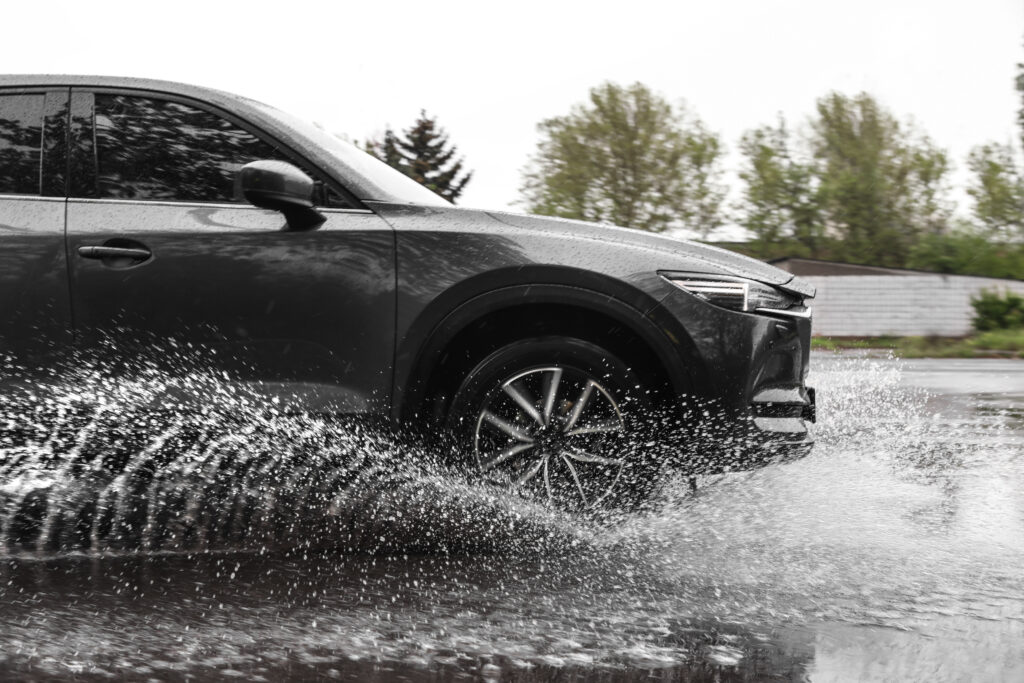When heavy rain hits Virginia’s roads, hydroplaning accidents can happen in an instant. A thin layer of water between your tires and the pavement can send even the most careful driver spinning out of control. These crashes aren’t rare, as Virginia’s mix of sudden storms, slick roads, and high-traffic highways makes hydroplaning a frequent cause of serious collisions each year.
After a hydroplane accident, questions about fault and insurance can get complicated fast. Even though weather plays a role, liability often depends on whether a driver was speeding, had worn tires, or failed to adjust to wet conditions. The car accident attorneys at Coletrane & Messersmith understand how hydroplaning cases are handled in Virginia, from proving liability to dealing with stubborn insurance companies. If a recent accident has left you and your family reeling, reach out to our team today for a free consultation.
What Is Hydroplaning?
Hydroplaning happens when your tires lose contact with the road because a layer of water or thin ice builds up beneath them. Instead of gripping the pavement, your tires start to glide, leaving you with little to no control over steering or braking.
In Virginia, where sudden rain showers and winter freezes are common, hydroplaning can happen almost anywhere, from busy interstates to quiet back roads. Even at lower speeds, just a small amount of water or ice can send a car sliding unexpectedly, turning an ordinary drive into a dangerous situation in seconds.
Main Causes of Hydroplaning
- Driving too fast in wet or icy road conditions
- Worn or underinflated tires that can’t push water away
- Sudden braking or sharp turns on slick surfaces
- Puddles, slush, or standing water on poorly drained roads
- Oil or debris that reduces traction on the pavement
- Using cruise control in rain, sleet, or freezing conditions
Common Injuries from Hydroplane Accidents
When a vehicle hydroplanes, the sudden loss of control often leads to high-impact collisions, rollovers, or multi-car crashes, leaving many with a wide range of injuries.
Common injuries from hydroplane accidents include:
- Whiplash and other neck or back strain injuries
- Concussions and traumatic brain injuries (TBI)
- Broken bones or fractures from impact
- Spinal cord injuries leading to reduced mobility or paralysis
- Cuts, bruises, and lacerations from shattered glass or debris
- Soft tissue injuries, including torn ligaments or muscle damage
- Chest or rib injuries from seatbelts or airbag deployment
- Emotional trauma, anxiety, or post-accident stress disorders
Who Is Liable in Hydroplane Accidents?
Liability in a hydroplane accident isn’t always clear-cut. While bad weather plays a role, drivers are still expected to operate their vehicles safely in inclement conditions. In Virginia, fault can fall on several parties depending on the circumstances, such as:
- A driver who was speeding, tailgating, or failing to adjust to wet or icy roads
- A vehicle owner who neglected tire maintenance or ignored worn tread
- A municipality or road authority that failed to address drainage issues or icy patches
- A construction company responsible for poor road design or maintenance
- A tire or vehicle manufacturer if a mechanical defect contributed to the crash
How Fault Is Proven
Proving fault in a hydroplane accident often requires a close look at the details, weather reports, skid marks, tire condition, and witness statements, all come into play. Car accident attorneys gather evidence such as police reports, testimony, and crash reconstruction data to show whether a driver acted carelessly, or a third party’s negligence contributed to the loss of control.
In Virginia’s fault-based insurance system, establishing fault is key to recovering compensation for your injuries and losses.
What Damages Can You Recover?
- Medical expenses: Hospital bills, surgeries, rehabilitation, and ongoing care
- Lost wages: Income missed while you recover from your injuries
- Reduced earning capacity: If your injuries affect your ability to work long-term
- Property damage: Repair or replacement costs for your vehicle and other belongings
- Pain and suffering: Compensation for physical pain and emotional distress
- Loss of enjoyment of life: When injuries limit your ability to participate in daily activities or hobbies
- Out-of-pocket expenses: Transportation to appointments, medical equipment, or other recovery-related costs
- Punitive damages: In rare cases, when another party’s actions were especially reckless or dangerous
Virginia’s Statute of Limitations for Filing a Hydroplane Accident Claim
In Virginia, you generally have two years from the date of the accident to file a personal injury claim related to a hydroplane crash. This legal deadline applies to seeking compensation for injuries, medical bills, and other losses resulting from the collision.
Missing these deadlines can prevent you from recovering any compensation, no matter how strong your case may be. Because evidence can fade and insurance companies move quickly, it’s best to consult a knowledgeable car accident attorney quickly after an accident.
Understanding Your Insurance Coverage
After a hydroplane accident, your insurance policy plays a major role in how your claim moves forward. In Virginia, your coverage may include liability protection, medical payments (MedPay), collision coverage, and uninsured/underinsured motorist (UM/UIM) benefits.
However, insurance companies often try to minimize payouts. At Coletrane & Messersmith, our experienced car accident lawyers will review your policy and communicate with adjusters on your behalf.
Why UM/UIM Coverage Matters in Hydroplaning Accidents
Uninsured and underinsured motorist coverage (UM/UIM) can be a financial lifesaver after a hydroplane crash, especially if the other driver doesn’t have enough insurance to cover your losses or flees the scene. Because hydroplaning accidents often involve multiple vehicles or chain reactions, it’s not uncommon for at-fault drivers to lack adequate coverage.
UM/UIM insurance steps in to help pay for your medical expenses, lost income, and property damage when the responsible party can’t. Using this coverage effectively ensures you’re not left paying out of pocket for an accident that wasn’t your fault.
What to Do After a Hydroplane Car Accident
- Check for injuries: Make sure you and any passengers are safe and call 911 if anyone is hurt.
- Move to safety: If possible, pull your vehicle to a secure spot away from traffic or oncoming vehicles.
- Call law enforcement: A police report will document the accident and is essential for insurance and legal claims.
- Exchange information: Get contact and insurance details from other drivers involved, as well as contact info for witnesses.
- Take photos and videos: Capture the accident scene, vehicle damage, road conditions, and any standing water or ice.
- Avoid admitting fault: Even casual statements can be used against you later when determining liability.
- Seek medical attention: Some injuries may not show up immediately, so it’s important to get checked by a doctor.
- Notify your insurance company: Report the accident promptly but avoid detailed statements until you’ve spoken with a lawyer.
- Contact a car accident attorney: Before giving any official statements, reach out to Coletrane & Messersmith for guidance on protecting your rights and pursuing fair compensation.
How an Attorney Can Help After a Hydroplane Accident
After a hydroplane accident, what you say and who you say it to can have a major impact on your ability to recover compensation. Insurance companies often move fast to protect their bottom line, sometimes twisting statements or using early conversations against you.
That’s why it’s essential to speak with a personal injury attorney before providing detailed information or accepting any settlement offers. A skilled car accident lawyer can handle communications on your behalf, investigate the crash, gather evidence like weather data and tire reports, and identify all potential sources of liability and insurance coverage.
Speak with Our Virginia Hydroplane Accident Attorneys Today
If you’ve been injured in a hydroplane accident in Virginia, the experienced attorneys at Coletrane & Messersmith are here to help. We carefully review your case, clarify your insurance coverage, and guide you through every step of seeking compensation for your injuries or property damage. Contact our skilled hydroplane accident lawyers today to get the advice and representation you need.



